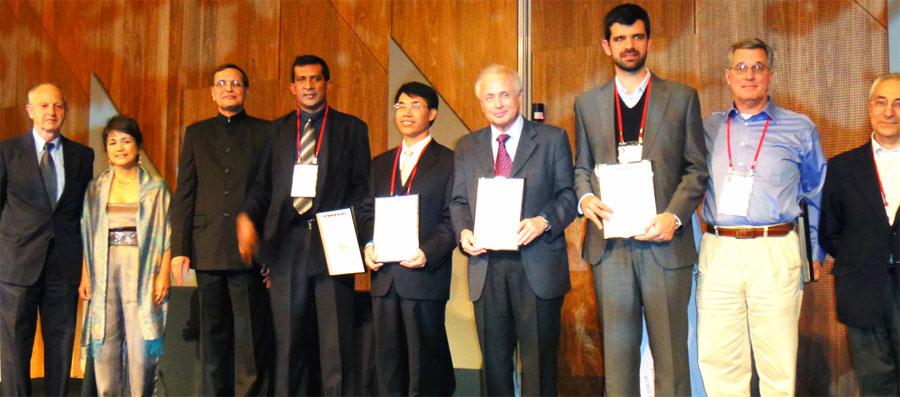
L-R: Dominique de Werra, Elise del Rosario, Subhash Datta pose with authors of finalist papers Dr. Dileep De Silva (Sri Lanka), Tiande Guo (China), Andres Weintrub (Chile), Raphael Leao (Brazil), Joao Figueiredo (Bolivia), and the representative of Javier Cano (Algeria)
Consistently committed to the promotion of OR in developing countries, IFORS has continued to improve the IFORS Prize. The 2011 IFORS Prize for OR in Development competition differed from those of the previous years in the following ways:
- The requirement that authors must be nationals of developing countries was removed;
- The Prize money was doubled; and
- Finalist papers went through the first round of the refereeing process of the IFORS Journal, International Transactions in Operational Research (ITOR). As is the previous practice, all competition papers are considered submitted to the journals without guarantee of acceptance.
The 2011 IFORS Prize competition recognized 22 full papers as valid entries. The process of selection was very rigorous and the eight-jury board was unanimous in selecting the eight finalists from eight countries. It was observed that some of the submissions have a team of researchers from both developed as well as developing countries.
All the 6 finalists (two papers were not presented since the authors could not come at the last moment due to reasons beyond their control) presented their papers on the first day of the conference. The criteria used for the selection process included: problem definition, creativity, appropriateness, OR content, structure and organisation of the paper, stress on development, actual/ potential impact of the study, oral presentations and handling of questions.
This evaluation led to the following decisions which were announced during the conference banquet of 14 July:

First prize certificate and prize money of USD 4000 was presented to Joao Neiva de Figueiredo and Miguel Angel Marca Barrientos for their paper titled “A Decision Support Methodology for Increasing School Efficiency in Bolivia’s Low Income Communities”. The paper used a DEA based DSS methodology for increasing School Efficiency with available scarce resources and sharing best practices across the network. The model was implemented and is continuing to impact a huge number of disadvantaged children in Bolivia’s poverty stricken areas. The paper was recognised for the approach and methodology to improve effective education as a means to help the most disadvantaged section of society move out of poverty.
The Runners-up prize certificate and prize money of USD 2000 was presented to Angel Luis Udias, David Rios Insua, Javier Cano and Hocine Fellag for their paper titled “ Cost Efficient Equitable Water Distribution in Algeria: A Bi- Criteria Fair division Problem with Network Constraints”. The paper addressed water distribution problem in Kabylia region, Algeria by using an ILP model to resolve the multi criteria decision problem in a cost-efficient manner. Various alternatives were generated to improve the current management processes and resolve implementation aspects.
Led by Subhash Datta, other members of the jury were Jan Van Vuuren, Celso Carneiro Ribeiro, Elise del Rosario, Leroy White, Hugo Scolnik, Theodor Stewart, and Arjan Shahani. Only the first four were around to participate in the final judging, the results of which came out after a very long deliberation. The other four finalists (in the order of country where the application was implemented) who were presented certificates of distinction were:
- Guo Tiande, Gao Suixiang, Zhao Tong, Chan Ge, Jiang Zhipeng, Sun Jing, Wu Gepeng, Han Congying, Wang Shenna, Zhang Wei and Kong Ruiyuan, “High Precision Coverage Optimization Models and Algorithms for GSM and TD-SCDMA Networks”;
- Vladir Marianov, Fernando Araya, Dell Robert, Donoso Pedro, Francisco Martinez and Andres Weintraub, “Optimizing Location and Size of Rural Schools in Chile”;
- Dileep De Silva and Sally Brailsford, “Using System Dynamics to Address Dental Workforce issues in SriLanka: A Practical Approach in a Developing Country”; and
- Leao Raphael, Oliveira Fabricio and Hamacher Silvio, “Dealing with Uncertainties in the Biodiesel Supply Chain Based on Small Farmers: A Robust Approach”.
The end of the July 14, 2011 presentation ceremonies marked the beginning of preparations for IFORS Prize 2014. The Prize has undergone many changes since its start in IFORS1987. Even as more changes will be introduced, the goal remains the same – to recognize practical OR work conducted to assist specific organizations in their decision-making process with the end of contributing to advancement of a developing country environment.

